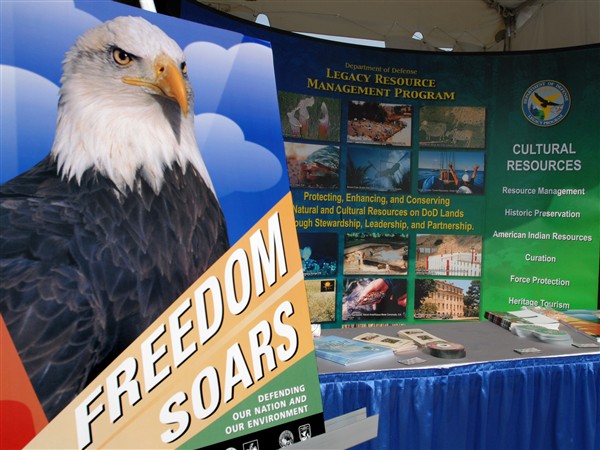[/av_textblock] [av_textblock size=” font_color=” color=” custom_class=”] U.S. Department of Defense
June 28, 2007
By Meghan Vittrup, American Forces Press Service

Challenger, a Bald Eagle, takes flight during the Bald Eagle Recovery and Final Delisting ceremony held at the Jefferson Memorial, June 28, 2007, as Interior Secretary Dirk Kempthorne (right) stands with his hand over his heart. Defense Dept. photo by Petty Officer 2nd Class Molly A. Burgess, USN
WASHINGTON, June 28, 2007 – After almost disappearing from the American scene, the Bald Eagle’s comeback is complete, thanks in part to the Defense Department.
Challenger, a Bald Eagle, takes flight during the Bald Eagle Recovery and Final Delisting ceremony held at the Jefferson Memorial, June 28, 2007, as Interior Secretary Dirk Kempthorne (right) stands with his hand over his heart. Defene Dept. photo by Petty Officer 2nd Class Molly A. Burgess, USN
(Click photo for screen-resolution image);high-resolution image available.
Interior Secretary Dirk Kempthorne and other officials made the announcement today at a ceremonial event held at the Jefferson Memorial here.
“Today, I am proud to announce the eagle has returned,” Kempthorne said. “Based on its dramatic recovery, it is my honor to announce the Department of the Interior’s decision to remove the American bald eagle from the endangered species list.”
“The Department of Defense spends about half a billion dollars on endangered species,” said Alex Beehler, deputy undersecretary of Defense for environment, safety, and occupational health.
The Defense Department and the U.S. Army Corps of Engineers collectively manage lands that host more than 440 Bald Eagle nests, and military installations have continued to work to help preserve the habitats of endangered species. Extensive monitoring programs are in place for threatened and endangered birds at military installations including Fort Riley, Kansas, Marine Corp Base Hawaii, and bases in San Diego.
The Legacy Resource Management Program protects the land, air and water belonging to the Defense Department. Officials also work to ensure the safety and health of humans and the aesthetic needs of the environment to preserve the riches of the land for generations to come.
The Bald Eagle has been the American symbol since 1782, when Thomas Jefferson and a committee of founding fathers decided to create a national seal. With its strength, grace, majesty, and uniqueness to America, the bald eagle was chosen. The symbol can still be seen throughout the United States today.
It graces various official seals, including those of the United States and the president, and various other seals. It also serves as the mascot for a countless number of schools and colleges across the United States, and it continually serves as an icon and symbol to service members. One well-known example is the Screaming Eagles of the U.S. Army’s 101st Airborne Division.
A few decades ago, the America symbol was at risk of disappearing from American skies, and it was first protected under the Bald Eagle Protection Act in 1940. It was later placed on the list of threatened and endangered species. Part of the blame was placed upon the pesticide DDT. DDT was known to create thin-shelled eggs that resulted in eggs that cracked before they were ready to hatch.
Today’s event began with an Indian blessing performed by Scott Aiken from the Interior Department’s Bureau of Indian Affairs. Kempthorne thanked the audience members for their efforts that led to removing the American Bald Eagle from the threatened and endangered species list, and — surrounded by local boy and girl scouts — he signed the document that made the delisting official.
“Recovery is a triumph,” Kempthorne said. “From this point forward, we will work to ensure that the eagle never again needs the protection of the Endangered Species Act.”

Scott Aiken of the Interior Department’s Bureau of Indian Affairs performs a Native American blessing during the Bald Eagle Recovery and Final Delisting ceremony held June 28, 2007, at the Jefferson Memorial, Washington, D.C. Defense Dept. photo by Petty Officer 2nd Class Molly A. Burgess, USN

A Defense Department’s Legacy Resource Management Program display shows a table of information during the Bald Eagle Recovery and Final Delisting ceremony held at the Jefferson Memorial, June 28, 2007. The display was one of many in which provided natural and cultural resource information. Photo by Petty Officer 2nd Class Molly A. Burgess, USN

Interior Secretary Dirk Kempthorne (right) stands next to Challenger, a Bald Eagle, after signing the final rule to delist the Bald Eagle during the Bald Eagle Recovery and Final Delisting ceremony, June 28, 2007, at the Jefferson Memorial, Washington, D.C. Defense Dept. photo by Petty Officer 2nd Class Molly A. Burgess, USN.

Interior Secretary Dirk Kempthorne (center) stands with his hand over his heart while former New York City
police officer Daniel Rodriguez (far right) sings the national anthem during the Bald Eagle Recovery and Final Delisting ceremony held at the Jefferson Memorial, June 28, 2007. Defense Dept. photo by Petty Officer 2nd Class Molly A. Burgess, USN

